Activities of Hithabrut – Tarabut
Amit Ramon began by introducing himself and giving us an overview on Hithabrut’s activities. Hithabrut and Tarabut are the Hebrew and Arabic word for “connection”. About seven years ago, making connections has been the idea of some radical leftists, who had been involved in direct actions inside Israel and the West bank before. They wanted to have a broader approach towards the sociology and economy of the Israeli society, the relation between Israelis and Palestinians, and the different types of oppressions by the state – the oppression of the Palestinians in the territories as well as within Israel, the oppression of mizrahim (Jews with Arab origin) in Israel, of poor people, or of refugees. They wanted to respond towards all of these oppressions, see the connection between each other and what is common between all these types. He pointed out that there are strong differences, especially related to the Green line, as to how the state treats on the one hand Jews and on the other hand Arabs or Palestinians, as most call themselves.
Public Housing
For over three years Hithabrut has been involved in the struggle on public housing. The state’s support for poor people has been decreasing for years now. The companies for public housing sold many apartments, but the earned money did not go back to the public housing sector. So the amount of available public housing apartments decreases as well. Some years ago there was a huge tent protest, started by Daphni Leef. The protesters complained about the cost of living. Amit appreciated the protest, but made clear that the problem is not the rent in Tel Aviv, but the situation of poor people, who don’t have any place to live, can’t buy any apartment, and can’t make a living at all. Their problems take place in the periphery, not in the center, where the protest took place on the Rothschild Boulevard. Hithabrut mainly supports people who are evacuated from public housing by the state. The reason is basically that many public housing companies move the tenants out of their apartments to sell the apartments or to tear them down and erect new big buildings instead in order to make more profit.
The Bedouins and the Situation in the Negev
Another struggle Hithabrut is involved in is the situation of the Bedouins in the Negev. Their story is long and started even before the Israeli state was founded. The Bedouins are the original residents of the desert, but the state of Israel always treated and treat them like they are nomads, like they just came from nowhere to Israel. The state claims that the Bedouins don’t have property and they don’t even have the right to have property. During the 1948 war Israel deported many of the Bedouins and only a low population remained, which was concentrated in a smaller area in the Negev by the new Israeli government. But by and by the Bedouins returned to their villages. Israel now discusses the so called Prawer plan, which is opposed by Hithabrut and others. The Prawer plan has not passed the Knesset but appears as an attempt to fix the practice of the last ten to 15 years into a law. The plan wants to relocate the Bedouins by re-settling them into government-build towns as a compensation for the Bedouins’ lost land. The government explains that this measure helps the Bedouins to connect to the 21st century by giving them better facilities and education. But: Nobody asked the Bedouins about what they want and how they want to live. Do they want to live in the custom way? Israel thinks it knows what’s good for them and this policy patronizing the Bedouins is one of the reasons why Hithabrut struggles against the Prawer plan. Another major reason is the theft of the Bedouin’s land by the state of Israel.
Asked for the government’s main reason behind the plan, Amit answered: “They want the land”. The government even plans to build a Jewish settlement exactly at the place where a Bedouin village is situated and urge them to leave the village in favor of “young, Jewish, ideological people”. The Negev is big, but half of it is used by the army for training and after all 30% of the Negev population are Bedouins. Yael emphasized that “Land is one of the most important assets in Israel!.”
Mizrahi and Developing Towns
Yael went on that not only the Bedouins are treated badly, but the inhabitants of development towns, mostly mizrahim, as well. Development towns are those which were populated during the fifties by immigrants from Arab countries. They were given houses, but as public housing. So some are still dependent on the good will of being allowed to stay in their houses. About 95 % or even more of the land in Israel is state owned. But it is mainly administrated by regional councils. They manage huge amounts of land, mostly agriculture, and earn lots of taxes, while small towns, many of them populated by mizrahim, who immigrated to Israel in the 1950s, get much less taxes. Yael gave the example of Dimona, a town in the Negev: The taxes from where the inhabitants work don’t go to the municipality of the town Dimona, but to the regional council next to it. Meanwhile they agreed that the council transfers little money to the town, but it keeps the land.
Hanoch added that the background for such a practice lies in the zionist policy. One of the basic ideas of Zionism is that you have to sit on the land to own it, and it has been the practice of a lot of settlements in the 1940th to take possession of the land by staying on it. Original councils were installed to organize this. It is true that some of the inhabitants bought land, but that’s similar as to the case of the Bedouins: The Bedouins partly possessed sort of certificates from the Ottoman government for their land in the Negev, because the land was granted to them. Some other land was rented or bought, but: These deals were not recognized later because Israel, as Yael said, sees land as its most important asset.
Israeli Antizionism
Amit went on about the work of Hithabrut and mentioned that it is a faction inside the party Hadash. Hadash is short for „democratic front for peace and equality“, has four representatives in the Knesset and is an anti-zionist left wing party. This remark and the descriptions about the Zionist policy towards land started a clarification about what antizionism is in Israel. The debate revealed how different the understanding and the contexts in Israel and Germany are concerning the term Zionism.
Amit explained that Zionism in his view is connected to Jewish colonialism. Antizionism objects this Jewish colonialism. One of the group asked whether they think that the state was a colonial state from the beginning. He intervened that there was a historical necessity in building a Jewish state, and asked whether they oppose that. Yael spontaneously denied. It is the practice which is colonial, but that doesn’t mean that Hithabrut thinks a Jewish state is not necessary. Zionism began once in Europe. But the practice has changed during the years and generations which act. For years a lot of people came to Israel to live in a Jewish state, be a Zionist. But that does not mean to throw people out of their houses or to fight against the Palestinians, who have been here and live next to us. So what we oppose is the way it’s being practiced today. My parents, for example, came from an Arab country; my mother is from Iraq, from Baghdad. Compared to the Jews from Europe, her life there was magnificent. Up until the establishment of the Jewish state they lived a great life there. In Bagdad 50% of the government and owners of businesses were Jews, they were important in Iraqi culture – the most important poets have been Jews, even up until now. But then things changed. Jewish people all over Europe lived in Ghettos, whether it was in Italy, France, or elsewhere, they were mistreated and haunted. And it affected being Jewish in a foreign, non-Jewish country. So even in Baghdad, a very Jewish-friendly town, there were riots, Jews were killed and slaughtered. I think that the Jewish state – or not the state, but a house for Jews, is very important when you look back to history.
Amit explicated some of the very different attitudes towards Zionism in Israel. The majority of Jews in Israel call themselves Zionists. But yet there are a lot of differences. Right-wing parties tell you that Zionism means only Jews should live here; the land, including the West bank, should belong to Jews and no Palestinian should live here or at least should have not the full rights. This is one way, an extremist way, of defining Zionism. On the other hand, there are left liberal parties, like Meretz e.g., or movements close to that. They tell you that Zionism for them is a safe place for Jews in the world, especially after what happened in the Second World War. But they are liberal as well and say they want equality between Arabs and Jews. But even these Zionists of the left side, I think, want to keep hold of their privileges – on land, on money, on education. What Hithabrut is saying is that there should be no differences between Israelis and Palestinians, that there should be equality. As for myself: I was brought up as a Zionist; my parents called themselves Zionists. My grandfather came from Europe shortly before the Second World War, but most of his family and their generation were murdered in the holocaust. But even my parents, who were born here, are affected by this history in the way they think, they look at things, even though they define themselves as leftists. After I became involved in politics I had this big change and became Antizionist. Since that, I have many arguments in my family. We agree on the basic principles, but not about the practice. The problem is the fear of Jewish people; this is sort of a trauma, even now, 70 years after the end of the war. It takes some time, I think, to overcome this view, to understand that Zionism even on the left side is just another political idea of men with their views, and these views are – for me – not democratic.
We explained that in Germany, the political idea of Zionism is connected to the building of the Jewish state, not to any later practice. Amit added that even under Israelis, you often have this simplistic view, because this is what the media and the government tell them all the time.
Another question revealed Hithabrut’s point of view concerning the one or two state solution. Yael deemed the two-state solution as inevitable. At least for now, this is the demand of the Palestinians of the territories – they want a state. Partly for economic reasons: Up to a few years ago, Palestinians came to work in Israel, but today, getting permission for that is a lot harder. At the same time, Palestinians have to buy a lot of products, even food like milk, from Israel. If they get it from another country they have to pay taxes to Israel. I can be very intellectual and say ‚I want a one state-solution‘ and a lot of Intellectuals – Palestinians and Jews – in Israel say so, but people in the occupied territories want their own state. And Hithabrut thinks that the occupied need to say what they want. And within Israel most people won’t listen to you when you talk about a one-state solution – the fear, whether realistic or not, is too big. And in a way, Yael concluded, the two state solution already exists.
Land Distribution
After changing the location, Yael caught up with introducing herself. She is not only a member of Hithabrut, but of the municipality of Tel Aviv in „the city for all“ faction. This group started more than five years ago with the goal of connecting between different struggles in Tel Aviv.
Hakeshet became well known for its struggle in Supreme Court cases on land distribution. To understand that, Yael gave us some more background. In Israel, over 90% of the land is owned by the state; nevertheless most people live in their own house. This is possible because Israelis buy the houses but lease the land. This form of leasing is less than owning but more than borrowing: After paying the lease, the land is yours and selling land means paying a tax to the authority and passing the lease duty to the buyer. The problem with the leasing system is that the government can say: This is our land and we need it; you have to move the house! And they do if they want. How likely it is it depends on how wealthy you are, how Jewish you are and so on. Hanoch added that this action is highly criticized because of the housing crisis. The basic idea of the government is to keep the lands in the hand of the Jewish people. So it is very bureaucratic to build a place, it takes years for the process to begin, so prices rise. So you can’t afford or even can’t get any other land to maintain your own house.
[We debated how different or similar the land leasing system is to Germany, where you also pay taxes for selling ground and the land (and house) can be nationalized for public interests. The main difference is probably – at least in practice, how easy it is for the state to confiscate land, for which reasons it can do so and how often it really does so.]Yael went on that the land, as already mentioned, is given to Kibbuzim, Moshawim or others, to work with it or just live on it. For that, they pay the lease to the original councils. But the situation is not equal between urban and rural land. People from rural areas are seen as more connected to their land, and so they got a lot of privileges. They can build nearly everything they want on rural lands. Every government, whether left or right, has a minister who is affiliated to them and will take care of their needs. Hakeshet’s court appeal was that the lands do not belong to them, instead it should go back to the country and distributed equally among all the people in Israel. It was a huge struggle at the Supreme Court, but Hakeshet won: the court decided that rural land has to be distributed equally. But nevertheless, due to political influence, the government managed to give the land to the rural people. At the moment there is a rumor in the Knesset that they might even get parts of the land they have leased for ownership. Yael underlined that to get the importance of those discussions, it is necessary to understand that “land is an explosive issue” in Israel. If I go to the settlements, whether moshawim, kibbutzim, or others, and say that I’m a director of the Mizrahi Rainbows, they “won’t let me out alive”.
Public Houses
Public housing is the only system of renting which still exists in Israel. As a renter it’s hard to maintain a family, because there are neither rent control nor any tenant rights in Israel: If you rent a house, the owner can say tomorrow,# that he needs his flat for other purposes. So Israel has no renting culture.
The aim of the government in Israel and the municipality of Tel Aviv is to close the public houses. Instead, they want to install a system of benefit payment to help the poor. Whereas in public houses, nobody can come and throw you out, with changing the system you can make a cut. For the tenants, benefits are no alternative: For public housing you pay a low amount of rent which depends on how much you earn. With a changed system the tenants are sent to the free market and their situation is even worse: The owner knows that you get money from the state and will either demand more shekels from you or won’t rent the house to you because you are poor.
The government decided years ago to stop building new public houses, because they don’t want those tenants. But who are the tenants? Let’s go back to our example in Dimona: Huge amounts of apartments called public houses have been built for the immigrants. Those people have nothing to give to their children. They are extremely poor. Once they die the children are being kicked out of the house. So you lose your parents and the next day you get a letter from the housing authority that you have to leave. So one thing we want to do is to make the apartments belong to the owners.
Meanwhile there is a law, called public housing law, which said that after you have lived in the house some years you can buy it for very cheap money. The only day this law was valid was on the 1st of January 2012. As soon as the law passed democracy, its implementation was paused by the clerk of the treasury. This is common in Israel, because we have a law that the head of the treasury can set out laws for a period of time because he deems them as too expensive in practice. This pausing has to be renewed every year, but this year they made a mistake, they forgot to pause it in time. We told all tenants to buy their houses and now all the purchase orders done in this time gap are before court at the moment.
Yael is convinced that public housing is the main answer to housing problems. But at the moment, nothing new is built, so only still existing apartments in the peripheral areas are offered. And especially the stock of houses in Tel Aviv is mostly sold by the housing companies and mainly not to the tenants. So less and less houses are available and the criteria for being eligible for public housing have tightened. Even if you are poor enough for public housing, you might stay on a list for ten years or more and wait for a free apartment.
Gentrification, Affordable Housing, and Public Housing
The sales of public houses in Tel Aviv are the result of the city’s strategy. Tel Aviv’s interest is to have less poor people in town, because they don’t pay many taxes. So there have been a lot of evacuations, especially from Jaffa more to the South of Tel Aviv. People could have been easily kicked out because they never owned their houses. Taxes and rents increased and especially the Palestinian residents were very poor and could not pay it. The result of this gentrification was that the population of Jaffa became more and more Jewish.
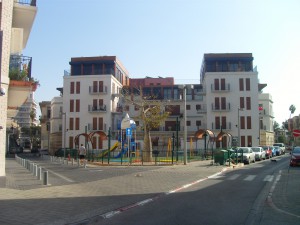
But Gentrification, Yael emphasizes, is not natural, as a lot people say. Tel Aviv, for example, has the first „affordable housing“ project in Israel. The aim of the affordable housing committee is to locate more high income people in town. Instead of focusing on areas where mainly rich people live, like the North of Tel Aviv, where high income people could be integrated as new habitants, they built a big new house in a poor people’s area in Jaffa or in the South. So what happened? The neighborhood data rose and when poor people applied for help at the government or municipality, they had problems to get benefit payment or redundancies. So they left to poorer areas where you don’t need to prove how much money you have – the fact that you live in an area which is approved as a poor quarter is enough to get for example a place in a cheap kindergarten. So it is easier to go away. But in the media, Tel Aviv’s affordable housing project comes out well. That’s how gentrification works.
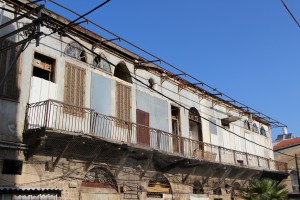
The housing movement in Israel is split. The Rothschild Boulevard protest movement is a middle class movement. Daphni Leef, who initiated it, is a very good person, but she represents a middle class which is suddenly unable to pay the rents in Tel Aviv. Ten thousand shekels a month for an apartment is normal. After a week of protests we saw that there was no talk about public housing, but on affordable housing. So the topic was the situation of the middle class, not of the poor people. We established peripheral forums with people from Jerusalem, Dimona, Beersheba etc. and did demonstrations and activities to shift the center of discussion towards the poor and their specific problems. At least, since the protests public housing has been in the news about once a week, which wasn’t the case before. But we did not manage to make the Rothschild protesters think about focusing on public housing.
Housing and Settlements
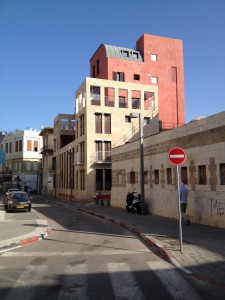
Yael and Amit draw our attention to another aspect on housing: an unfortunate connection between housing and settlement policy. In Israeli politics there are two persons who mostly influence housing policy. On the one hand there is the minister of Finance, Ya’ir Lapid, from the party ‘Jesch Atid’. He is very capitalist and takes special care of the middle class. On the other hand there is the housing minister Uri Ariel from the ‘Jewish Home’, a party which aims primarily at settling the West bank. So the first want poor people to leave, and the second want them to live in the territories and say: ‘If you want public housing you can go to the West bank’. Many poor people go, because they can never afford a house in Tel Aviv, especially not with several children, but they can have one in the settlements. Some of the settlers in the territories are ideological, but others just want a house for themselves and their children. You can say that Ariel is the worst housing minister we ever had and Hithabrut did a lot of demonstrations against him.
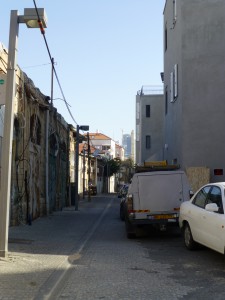
So instead of allocating resources within Israel, the government sort of solves the housing problem east of the green line. Whether it is cheaper in the end or not: They use the money which is taken from the public housing sector, and they use resources from occupied territories. You can connect this with the aspect of colonialism we explained before. Because that is what we Israelis do: We occupy territory of other people and then we use their resources like land, and water.
Future Strategy?
Yael summarized that the situation today in Israel is very bad. The only way to make public housing work again is to present it in the public sphere so it stays in people’s minds. Having a house, a roof on one’s head is a basic need. We have to convince the middle class to fight for it. At the moment, the middle class fights for itself. And they have more power than we do. But affordable houses means that public housing will be demolished. People often refer to a broadly existing solidarity in Israel. But „that’s bullshit“. Everybody talks about the kibbutzim, but they were communist or socialist between themselves, but the people surrounding them were slaves in a way. You can’t be socialist just up to your doorstep. The middle class never really thought about poor people in Israel. They created them. As long as the middle class does look only at its own, there is no space for public housing. That’s why we have been different blocks in the same demonstration.
Links and References
The film “pourqoit Israel” by Claude Lanzmann describes how migrants are settled in the new houses in the 1950th in the developing towns
